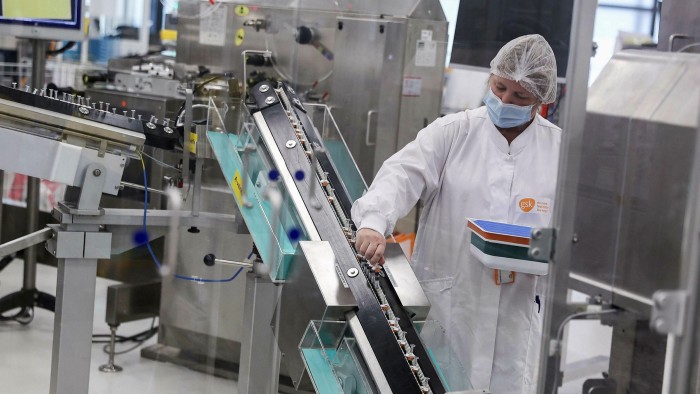GSK Covid treatment shows ‘profound efficacy’ in initial trial

Roula Khalaf, Editor of the FT, selects her favourite stories in this weekly newsletter.
GlaxoSmithKline plans to apply for emergency use authorisation for an experimental Covid-19 treatment after initial clinical trial results showed an 85 per cent reduction in hospitalisation or death.
GSK, which developed the antibody treatment with Vir Biotechnology, said separate lab tests of the drug suggested it was also effective against some of the virus variants in circulation.
An independent data monitoring committee recommended stopping the GSK/Vir Biotechnology trial early due to evidence of “profound efficacy”, the companies said on Thursday.
That recommendation was based on an interim analysis of data from 583 non-hospitalised patients, which found an 85 per cent reduction in hospitalisation or death compared with a placebo.
Chris Corsico, GSK’s senior vice-president for development, said the result was “an overwhelmingly positive outcome”. The drug is currently administered intravenously but developers are looking to create a formulation that could be given by intramuscular injection, he told the Financial Times.
GSK and Vir will seek emergency use authorisation from the US “immediately” as well as approvals in other countries.
The US Food and Drug Administration has already authorised some antibody treatments for Covid-19 but there is not yet robust data showing their efficacy against virus variants.
Antibody treatments aim to boost the natural defences of patients that struggle to mount their own immune response.
Craig Tipple, GSK’s medical lead for the programme, said the trial had recruited patients in countries including Spain and Brazil. To be eligible, patients had to be either over the age of 55, or older than 18 with at least one high risk factor for Covid-19, such as diabetes, he said.
Barclays analysts called the news “a small positive” for GSK. It is only entitled to 27.5 per cent of profits from the drug.
“The company does see this asset as having blockbuster potential, but that will very much depend on the shape of the pandemic going forward,” they wrote in a research note.
Separately on Thursday, Roche said a trial evaluating the combination of its drug Actemra and Gilead’s remdesivir brought no reduction in the risk of death or the length of stay in hospital.
The patients in the GSK/ Vir trial will be followed for another six months, with more data becoming available later.
Comments